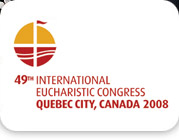|
A major event of Quebec 2008 celebrations
Sense of the Event
Festivities commemorating the 400th anniversary of the foundation of Québec and their religious dimension.
The year 2008 marks the 400th anniversary of Québec, the first permanent French establishment in America. This anniversary will be celebrated by important activities.
The arrival of the French in Québec City also marks the beginning of the Catholic Church north of Mexico because, from the start, people with strong faith settled here, to be joined shortly thereafter by the first Recollect and Jesuit missionaries and by the first religious congregations of women, the Ursulines and the Augustines.
The religious dimension will play an important role in the festivities of 2008 since the Catholic Church has played and still plays an essential role in the life of its people. In order that this religious aspect of festivities can meet with people of various interests and of all origins, our diocesan Church is planning a variety of activities throughout the year. Furthermore, an initial contact with the leaders of other Christian churches allows us the hope of organising activities of an ecumenical nature.
Highlight of Religious celebrations : the 49th International Eucharistic Congress (June 15 - 22, 2008)
With the support of the Conference of Catholic bishops of Canada, Québec's archbishop proposed to his Holiness that the 49th International Eucharistic Congress be celebrated in Québec city in 2008. This congress will constitute the most important religious event of 2008. Pope John-Paul II officially announced the holding of the Congress in Québec during his speech of October 17, 2004, which inaugurated the Year of the Eucharist.
The theme of the congress is : "The Eucharist, gift of God for the life of the world". As Cardinal Ouellet remarked "The Eucharist, as we receive it from the account of its institution, is evidence of the gift which the Son made of Himself for the multitude, a gift of love for the Father and for us, which seals the New Covenant . It can be seen also as the gift which the Father makes to the world of his only Son, incarnate and crucified, who gathered around His table the dispersed children of God. Finally, it is the gift of Trinitarian communion for the life of the world by the action of the Holy Spirit which assures the intimate participation of the faithful in this mystery of the Covenant."
What an International Eucharistic Congress is
The first International Eucharistic Congress, held in France in 1881, was an assembly of 300 persons directing Eucharistic movements in European countries. During the 125 years that followed, congresses evolved strongly in form and now attract some 12,000 to 15,000 participants for one full week of celebration, adoration, catechism, cultural events, fraternal encounters, and involvement in favour of the needy. Public events, especially the closing Mass, attract considerable crowds. It should be noted that each congress is preceded by a theological and pastoral symposium to deepen understanding of an aspect of the Eucharistic Mystery.
The Statutes of the pontifical committee for International Eucharistic Congresses (1986) states :
"In preparing a congress, stress shall be laid on intense catechesis on the Eucharist as the Paschal Mystery of Christ… an active and conscious participation in the Liturgy …..a careful choice of initiatives and the diligent carrying of social works in such a way that the Eucharistic table may be a sign of solidarity and sharing with the poor. " (art. 20)
The presence of the Pope at the closing of the Eucharistic Congress
Since 1881, the pope has always been represented by a special delegate at the celebration of Eucharistic Congresses. In 1964, Pope Paul VI took part in the final two days of the Congress held in Bombay, initiative which was repeated by his successor John Paul II during the congresses that followed.
We can therefore confidently hope that Benedict XVI will continue the tradition and that he will conclude the Eucharistic Congress of Québec. That will be a great joy and a moment of grace for our Church. Nevertheless, the presence of the pope should not make us forget that the centre of attention is the Eucharist, and that the pope is primarily a servant of the Eucharist, confirming by his presence the universal character of the event.
|




